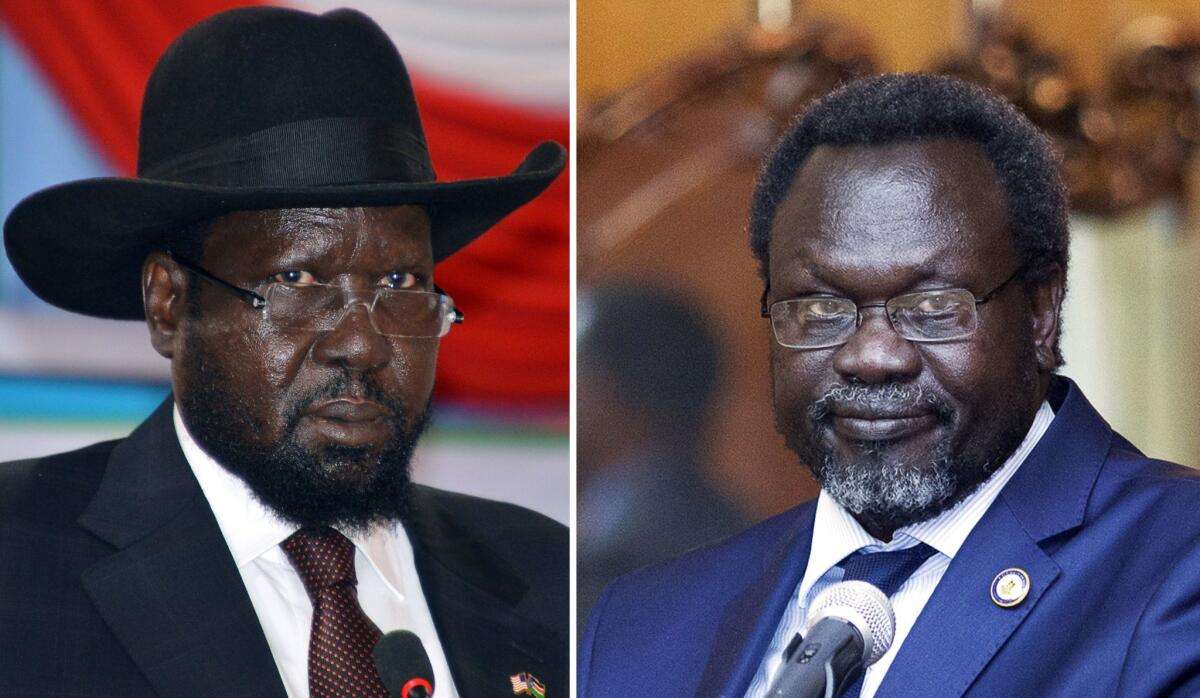Another deadline blown in search for peace in South Sudan

A combination of file pictures from 2014 shows South Sudanese President Salva Kiir, left, and the leader of South Sudan’s largest rebel group, Riek Machar.
- Share via
Reporting from Johannesburg, South Africa — South Sudanese President Salva Kiir demanded more time to consider a proposed peace deal, apparently brushing aside a Monday deadline for leaders to make peace or face international sanctions.
The government of South Sudan tweeted a comment from Kiir late Monday saying, “Peace that cannot be sustained cannot be signed.” That reprised reservations Kiir expressed to journalists Sunday before flying to Ethiopia for the peace talks.
“If it is signed today and then tomorrow we go back to war, then what have we achieved?” the government tweeted on Kiir’s behalf.
Both sides were under intense international pressure – and the threat of sanctions – to sign a deal before Monday’s deadline expired.
Both Kiir and his rival, rebel leader Riek Machar, had downplayed hopes of a peace deal in recent days. However, Machar and another key figure in the talks, Pagan Amum, secretary general of South Sudan’s ruling SPLM party, signed the compromise deal involving a government of national unity. Amum, however, did not represent the government.
With Machar having signed the deal Monday, the pressure is on Kiir to agree to the deal in 15 days or risk being blamed for the failure of peace talks and face sanctions.
After 20 months of fighting between factions of what many consider the young country’s kleptocratic elite, international patience has worn thin, and there was little optimism heading into the final round of talks before the Monday deadline to reach a deal.
Before flying to Addis Ababa, the Ethiopian capital, Sunday, Kiir used a recent split in rebel forces – after the defection of two generals from Machar’s forces – to maintain that it wouldn’t be possible to reach a lasting peace deal.
Haile Michael, spokesman for the mediation team of the east African bloc, the Intergovernmental Authority on Development, had suggested early Monday that a compromise was likely to be signed, the Associated Press reported.
Kiir witnessed the signing and initialed the deal but didn’t put his signature to it, demanding more time, raising fears that efforts to resolve the war would once more fail.
Since fighting broke out in December 2013, several attempts to negotiate a peace deal have failed. The two sides have signed successive ceasefire deals, none of which has held.
The ruling SPLM party and the army split when fighting broke out, and ethnic violence broke out in the capital, spreading to many parts of the country, as both sides scrambled to control the oil that accounts for most government revenue.
The compromise deal under negotiation would set up a power-sharing government for three years, leading to elections.
The fighting has had dire humanitarian consequences. Parts of the country are on the brink of famine, according to humanitarian agencies; 70% of the population is in need of humanitarian aid, and more than 2 million people have been displaced.
Both sides in the conflict have committed atrocities, according to Human Rights Watch and Amnesty International. Human Rights Watch last month reported that government forces had hanged, shot and burned alive civilians, including women and children, and had carried out widespread rapes and looting in an offensive in the rebel stronghold of Unity State in recent months.
Follow @RobynDixon_LAT for news from Africa
More to Read
Sign up for Essential California
The most important California stories and recommendations in your inbox every morning.
You may occasionally receive promotional content from the Los Angeles Times.













